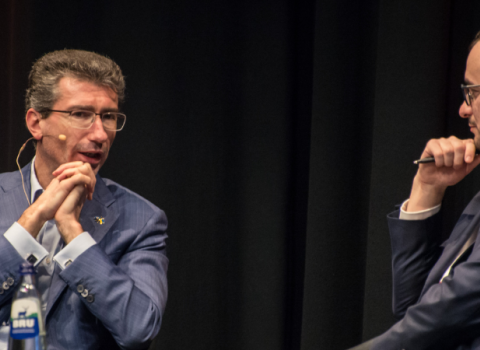BRUSSELS, 13 September 2016 – Why do people eat when they aren’t really hungry? Is the traditional Mediterranean diet, high in fruits and vegetables and low in red meat, better for you? Can social sciences help us better organise the way we get and distribute food?
These are among the questions being studied now by scores of scientists funded by the European Research Council (ERC), the EU’s premier frontier-research funding organisation. ERC-funded research is highlighted in a new, special online report, at www.sciencesquared.eu.
All of these projects were proposed directly by the researchers, purely driven by their scientific curiosity, and in response to the ERC’s annual open calls for excellent research in any field. In all, about 140 ERC projects over the past decade have been or are related to food and nutrition, with nearly €250 million in total funding.
That so many touch upon eating underscores that top researchers deem it a theme worth exploring. The importance of diet, the food cycle and nutrition cannot be over-estimated these days - at a time of rising obesity, diabetes and cardiovascular disease in much of the world. At the same time, food security and purity are growing worries. And fad diets, high-pressure advertising and just plain misinformation confuse many.
The researchers hope their work can make a real difference. And it is an example of the wide range of fundamental research - from physics to history - being advanced thanks to ERC funding.
The special report on this research is part of an ERC-funded effort to highlight cutting-edge research done by its grantees whose work can affect our lives. Giving top researchers free reign to explore the frontiers of our knowledge indeed often leads to remarkable breakthroughs.
Science|Business, a Brussels and London-based media and communications company, leads the project, called ERC=Science2. Other partners include Ecsite, the association of European science museums, which is planning museum exhibits on this food research in coming months across the EU.
* * *
The first instalment in this report, released 13 September 2016 online, includes research on the traditional Mediterranean diet, rich in fruits, vegetables, fish, nuts, whole grains and olive oil – and moderate amounts of red wine. We know it’s healthy. But how?Miguel A. Martinez-Gonzalez, of the University of Navarra, is testing it now, in a large random trial of people in Spain. In an earlier trial, he followed 7,447 Spaniards judged to be at risk of cardiovascular disease. He put them on variations of the "Med diet", and within five years found a 30 per cent reduction in cardiovascular risk. Conclusion: “Among persons at high cardiovascular risk, a Mediterranean diet supplemented with extra-virgin olive oil or nuts reduced the incidence of major cardiovascular events.”
But why? Are there other health benefits? That’s what Martinez-Gonzalez wants to know, in his current research project for the ERC, Predimed-Plus.
The next instalment in the report, 30 September 2016, focusses on a food sharing project.
Cutting-edge ‘sharing’ apps provide a potential solution to bring together wasteful and hungry consumers. SHARECITY, led by Anna Davies of Trinity College Dublin, has developed an innovative, collaborative approach to assess the practice and sustainability potential of city-based food sharing economies around the world.
Her database has identified more than 4,000 enterprises in 100 global cities in which food sharing plays an active and transformative role in advancing urban sustainability through resource conservation, food waste reduction and the building of communities.
Initial analyses confirm that London is leading the way with 198 enterprises, followed by New York with 188 and Melbourne with 144. Dublin ranks 36 in the list, with 42 enterprises, which include the likes of FoodCloud, Fumbally, WeShare, and Newmarket Kitchens, opening eyes and minds to a practice that may become the norm in decades to come.
For more information:
William Echikson, Science|Business
E-mail: [email protected]
Telephone, +32475669736.
About the European Research Council
The European Research Council (ERC), set up by the European Union in 2007, is the first European funding organisation for excellent frontier research. It encourages top researchers of any nationality based across Europe to pursue their most creative ideas and compete for funding. , It has a budget of over EUR13 billion for the period 2014 to 2020 and is part of the EU research and innovation programme, Horizon 2020. Since its launch, more than 6,500 researchers have been selected for funding from more than 50,000 applications. The ERC grantees have won prestigious prizes, including 5 Nobel Prizes, 3 Fields Medals and 5 Wolf Prizes.. More than 20,000 articles acknowledging ERC-funding have appeared in peer-reviewed high impact journals between 2008 and 2013.
About the ERC=Science2 consortium
A three-year communications effort on behalf of the ERC to highlight its funded research is being mounted by a consortium of media, university, industry and science-museum organisations. The group is led by Science|Business, a media and communications company based in Brussels. The consortium also includes, The European Network of Science Centres and Museums, European Industrial Research Management Association, Vision2020, University College Cork, Euro-Mediterranean University of Slovenia and University of Zagreb School of Medicine.





 A unique international forum for public research organisations and companies to connect their external engagement with strategic interests around their R&D system.
A unique international forum for public research organisations and companies to connect their external engagement with strategic interests around their R&D system.